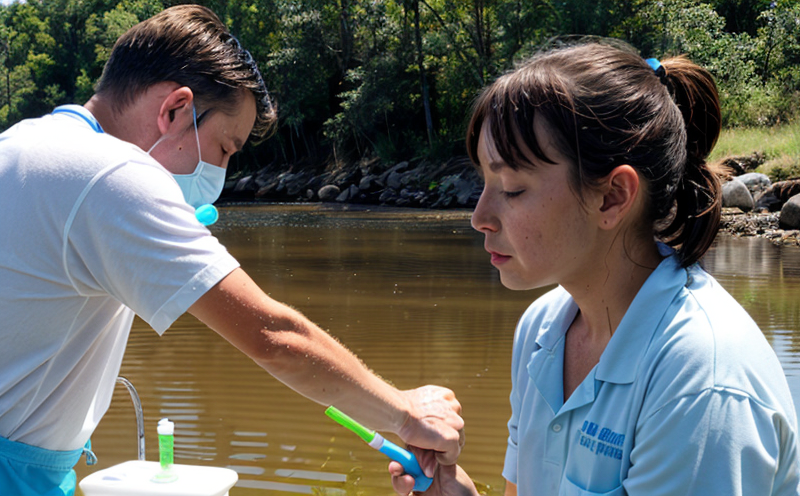EPA 160.1 Total Solids Test in Water
The EPA 160.1 method is a standardized approach used to determine total suspended solids (TSS) and total dissolved solids (TDS) in water samples. This test plays a critical role in environmental monitoring, ensuring compliance with federal regulations and providing data essential for assessing the quality of water resources.
The primary goal of the EPA 160.1 method is to quantify both suspended and dissolved solid particles that contribute to the overall turbidity and salinity levels of a water sample. These solids can originate from various sources such as industrial effluents, agricultural runoff, and urban stormwater. The test results provide valuable insights into the purity of natural water bodies, drinking water supplies, and wastewater treatment processes.
The method involves several steps to ensure accurate measurement, including proper sampling techniques, filtration procedures, drying protocols, and gravimetric analysis. Each step requires meticulous attention to detail to minimize errors and bias in the final results. The EPA 160.1 methodology is widely recognized for its reliability and accuracy across different water matrices.
The instrumentation used for this test includes precision balances capable of high-precision weighing (
The test procedure begins by collecting representative water samples according to standard sampling procedures (e.g., USEPA 1316). Once collected, the samples are filtered through pre-weighed filters using a vacuum filtration system. After filtering, the filters are dried in an oven at specified conditions and then reweighed to calculate TSS. For TDS determination, the same filter is used after being rinsed with deionized water to remove any residual solids before drying.
Compliance with EPA 160.1 ensures accurate quantification of total suspended and dissolved solids in various types of water matrices, including surface waters, groundwaters, industrial process waters, and wastewater streams. This method supports regulatory compliance requirements for industries such as drinking water treatment plants, municipal utilities, environmental agencies, and manufacturing sectors.
Understanding the significance of total suspended and dissolved solids is paramount when evaluating the impact of human activities on aquatic ecosystems. Elevated levels of these particles can lead to reduced light penetration in water bodies, increased oxygen demand from biodegradation processes, and potential harm to aquatic life. Accurate measurement through EPA 160.1 helps stakeholders make informed decisions regarding pollution control strategies and environmental protection measures.
Given the importance of this test in ensuring public health and ecological sustainability, accurate implementation is essential. Proper training for personnel involved in sample collection, filtration, drying, and weighing processes is critical to maintaining consistent and reliable results across multiple laboratories performing EPA 160.1 tests.
Industry Applications
| Application Area | Description |
|---|---|
| Municipal Water Treatment | Determining the total solids content in treated water helps ensure that drinking water meets stringent quality standards. |
| Agricultural Runoff Monitoring | Measuring TSS and TDS levels aids in assessing the impact of agricultural practices on nearby water bodies. |
| Industrial Wastewater Treatment | Monitoring total solids assists in evaluating the efficiency of industrial wastewater treatment processes. |
| Environmental Impact Assessment | The EPA 160.1 method supports comprehensive environmental assessments by providing reliable data on water quality parameters. |
The EPA 160.1 Total Solids Test in Water is widely used across various sectors, including municipal water treatment plants, agricultural and industrial facilities, environmental consulting firms, and governmental agencies responsible for enforcing water quality regulations.
Eurolab Advantages
At Eurolab, we offer unparalleled expertise in performing the EPA 160.1 Total Solids Test in Water, ensuring precision, accuracy, and reliability throughout every step of the process.
- Highly Skilled Personnel: Our team consists of certified and experienced professionals who adhere strictly to established protocols for sample handling, filtration, drying, and weighing.
- State-of-the-Art Equipment: We utilize advanced instruments like precision balances with microgram sensitivity, high-efficiency vacuum filtration systems, and controlled-temperature drying ovens.
- Comprehensive Reporting: Our reports include detailed methodologies, raw data, and interpretative analyses to provide comprehensive insights into water quality parameters.
- Rigorous Quality Control: Eurolab maintains strict internal controls and participates in inter-laboratory comparison programs to ensure consistent results across all tests.
Our commitment to excellence ensures that clients receive trustworthy, reliable data essential for making informed decisions regarding water quality management and environmental compliance.





